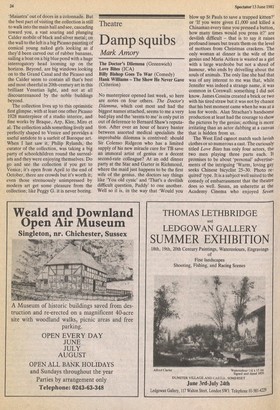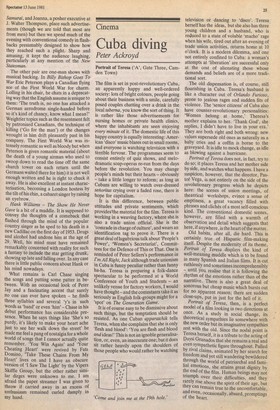Theatre
Damp squibs
Mark Amory
The Doctor's Dilemma (Greenwich) Love Bites (ICA) Billy Bishop Goes To War (Comedy) Hank Williams — The Show He Never Gave (Criterion) No masterpiece opened last week, so here are notes on four others. The Doctor's Dilemma, which cost most and had the biggest names attached, seems to me a very bad play and the 'seems to me' is only put in out of deference to Bernard Shaw's reputation. After over an hour of heavy banter between assorted medical specialists the improbable dilemma is contrived: should Sir Colenso Ridgeon who has a limited supply of his new miracle cure for TB save an immoral artist of genius or a decent second-rate colleague? At an odd dinner party at the Star and Garter in Richmond, where the maid just happens to be the first wife of the genius, the doctors say things like 'You old cynic' and 'That's a devilish difficult question, Paddy' to one another. Well so it is, in the way that 'Would you blow up St Pauls to save a trapped kitten?' or 'If you were given £1,000 and killed a Chinaman every time you pressed a button, how many times would you press it?' are devilish difficult — that is to say it raises profound issues but treats them on the level of mottoes from Christmas crackers. The only woman at dinner is the wife of the genius and Maria Aitken is wasted as a girl with a large wardrobe but not a shred of humour, who ends by drivelling about the souls of animals. The only line she had that was of any interest to me was that, while Jennifer was indeed a strange name, it was common in Cornwall: something I did not know. James Cossins created a brick or two with his tired straw but it was not by chance that his best moment came when he was at a loss for words. Alan Strachan's handsome production at least had the courage to show the pictures by the genius; nothing is more irritating than an actor dabbing at a canvas that is hidden from us.
The West End cimnot match such lavish clothes or so numerous a cast. The curiously titled Love Bites has only four actors, the two men playing three parts each. It promises to be about 'personal' advertisements of the intriguing 'Warm, loving gay seeks Chinese bicyclist 25-30. Photo required' type. It is a subject well suited to the comedy of embarrassment that the theatre does so well. Susan, an usherette at the Academy Cinema who enjoyed Seven Samurai, and Joanna, a posher executive at J. Walter Thompson, place such advertisements (though we are told that most are from men) but then we spend much of the evening with conventional comedy in flashbacks presumably designed to show how they reached such a plight. Sharp and amusing, it kept the audience laughing, particularly at any mention of the New Statesman.
The other pair are one-man shows with musical backing. In Billy Bishop Goes To War Eric Peterson plays a Canadian flying ace of the First World War for charm. Lolling in his chair, he chats in a deprecating way that the English assume is unique to them: 'The truth is, no one has attacked a German aerodrome single-handed before so it's kind of chancy, know what I mean?' Weightier topics such as the resentment felt by patronised Canadians, the technique of killing ('Go for the man') or the changes wrought in him drift pleasantly past in his company. The First World War was intensely romantic as well as bloody but when Peterson is given romantic material (about the death of a young airman who used to swoop down to read the time off the same church tower on each return until the Germans waited there for him) it is not well enough written and he is right to chuck it away. He is also excellent at instant characterisation, becoming a London hostess by the tilt of his chin, a cabaret singer by raising an eyebrow.
Hank Williams — The Show He Never Gave is a bit of a muddle. It is supposed to convey the thoughts of a comeback that flashed through the mind of the popular country singer as he sped to his death in a new Cadillac on the first day of 1953. Drugs and alcohol had undone him at the age of 29. Well, his mind must have remained remarkably concerned with reality for such a fantasy to include the star getting drunk, showing up late and falling over. In any case there is little public concern about Hank or his mind nowadays.
What remains is Carl Chase singing the songs and putting some patter in between. With an occasional look of Peter Jay and a fascinating accent that surely no one can ever have spoken — he finds three syllables and several 'y's in such words as 'band' or even 'him' — Chase in his debut performance has considerable presence. When he says things like 'She's so purdy, it's likely to make your heart ache just to see her walk down the street' he made me feel a pang of nostalgia for a whole world of songs that I cannot actually quite remember. 'You Win Again' and 'Your Cheating Heart' were revived by Fats Domino, 'Take These Chains From My Heart' lives on and I have an obscure version of 'I Saw The Light' by the Vipers Skiffle Group, but the other rather similar dirges were unknown to me. I am afraid the paper streamer I was given to throw if carried away in an excess of enthusiasm remained curled damply in my hand.







































 Previous page
Previous page